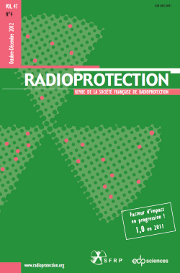No CrossRef data available.
Article contents
Some subjects in developing the system of environmental radiation protection in Japan
Published online by Cambridge University Press: 17 June 2005
Abstract
The environmental radiation protection has been investigated on the basis of the radiological impacts on biota which are mainly caused by nuclear accidents, and the radiation doses of some plants and animals have been actually monitored in the natural environment. The investigation clearly shows that some radiological effects in the natural environment can be detected before the actual harmful effects occur, because the minimum radiation doses at which harmful effects have been observed are sufficiently high, compared with the radiation doses currently monitored in the natural environment. But, at the same time, it has been accepted that continuing investigations on the radiological effects on ecosystem are indispensable for the establishment of radiation protection system for biota to confirm that the environment has been properly protected from the potential exposure of radiation. The examinations of the risk perception of Japanese people also suggest that the communication with the public about the actual condition of the natural environment on the basis of the scientific data and the opinions of scientists of many fields is very important, because Japanese people tend to be extremely sensitive to the radiological effects on the natural environment.
- Type
- Research Article
- Information
- Copyright
- © EDP Sciences, 2005


